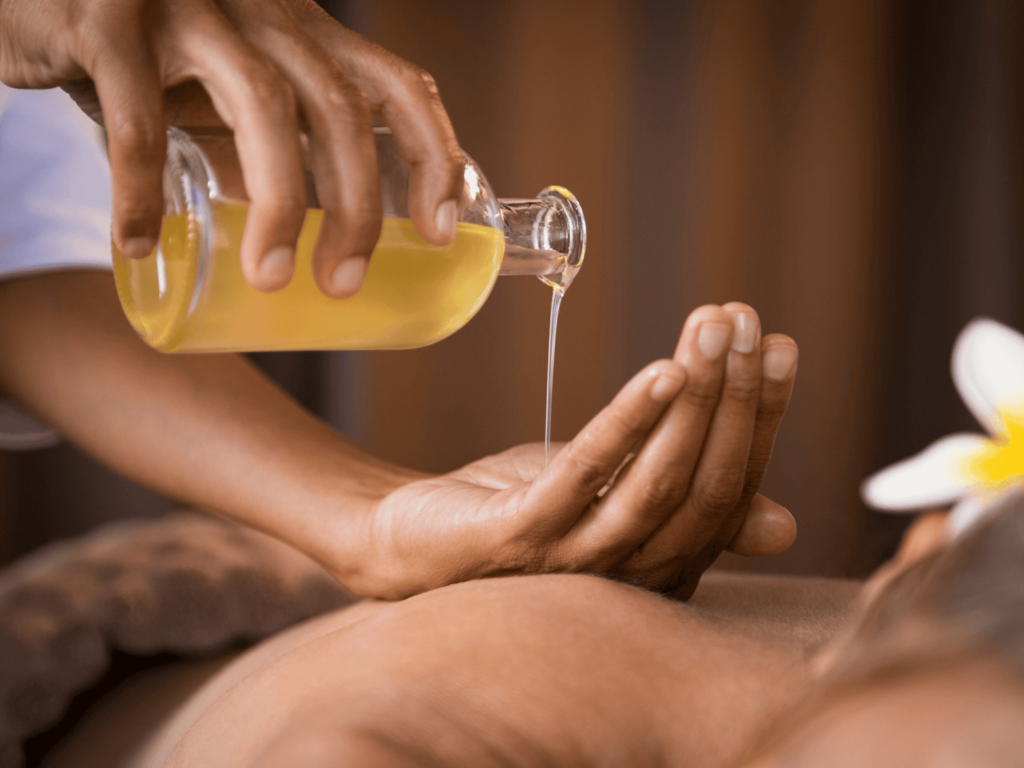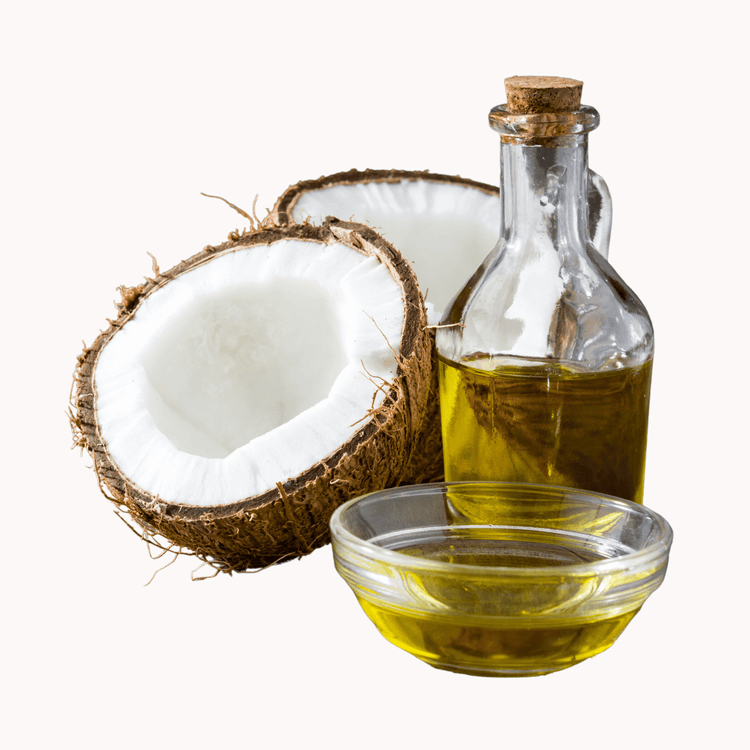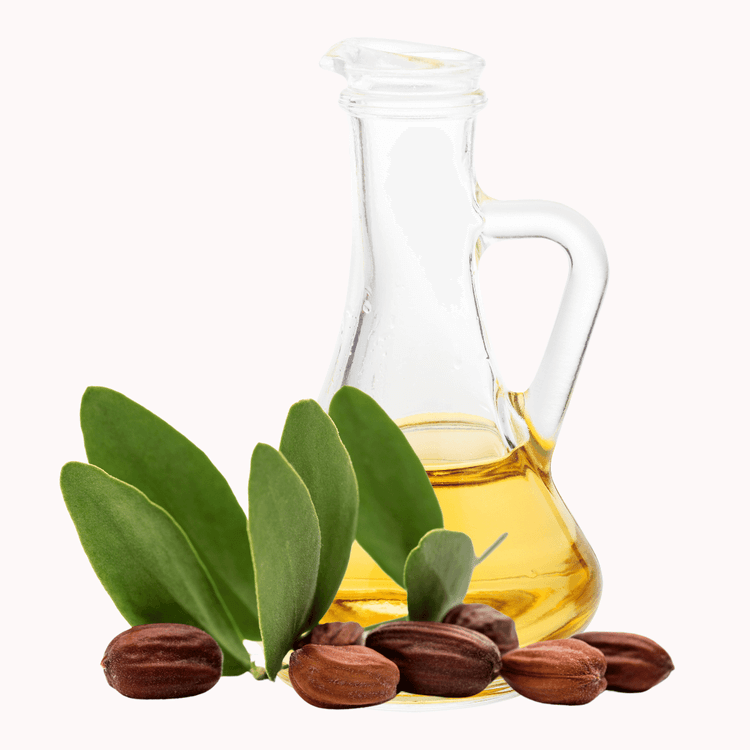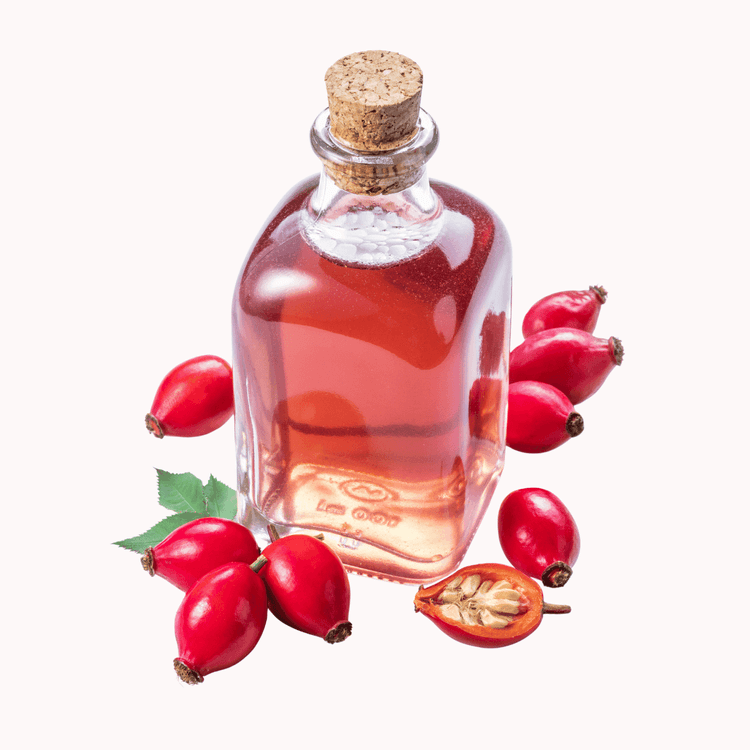Heads up! We may use affiliate links in this post. You'll never pay more, but we might earn a small commission if you buy - thanks for supporting us! See our full disclosure here.
Ever feel like your current moisturising routine just isn’t cutting it?
Today, we’re diving into the wonderful world of natural body oils and how they can transform your skincare game.
Natural body oils = powerhouses of hydration that can give your skin that coveted healthy glow.
And the best part?
You can easily incorporate them into your own DIY skincare recipes.
In this post, we’re sharing 12 hydrating skin recipes that harness the magic of natural body oils for those of you who are battling dry patches, looking to brighten your complexion, or just want to upgrade your self-care routine.
From soothing bath oil blends to nourishing face masks, these recipes will help you create spa-worthy treatments right in your own home.
Plus, you’ll know exactly what’s going on your skin – no mysterious ingredients here!
First, Let’s Talk The Benefits Of Natural Body Oils

When it comes to hydrating your skin, DIY natural body oils, also known as ‘carrier oils’ are a game-changer. Here is a quick run-down of their benefits:
You have complete control over the ingredients used, so you know exactly what you’re putting on your skin. This is especially beneficial for those with sensitive skin or allergies, as you can tailor the recipe to suit your needs.
Making your own body oils at home is usually more cost-effective than buying them from shops. When you buy ingredients for your recipes in bulk and mix them yourself, you can save a lot of money over time and still get an amazing product.
As I touched on earlier, DIY body oils can be customised to address specific skin concerns. Whether you’re looking to hydrate dry skin, soothe irritation, or improve the appearance of scars and blemishes, you can adjust the ingredients and proportions accordingly to create a personalised formula that works perfectly for you.
That’s the benefits covered, but what oils should you be using?
Understanding Different Types of Natural Body Oils
When it comes to natural body oils, there are several options to choose from, each with its unique properties and benefits.
Here are some popular natural body oils and their characteristics:
Coconut Oil

Known for its intense moisturising properties, coconut oil is rich in fatty acids that nourish and hydrate the skin, especially beneficial for dry and sensitive skin.
According to Healthline, it also has antimicrobial properties that protect against harmful microorganisms.
This makes coconut oil a powerful ingredient to use when treating skin infections such as acne, folliculitis, cellulitis, and athlete’s foot.
YOU MIGHT LIKE THESE TOO:
- 8 DIY Exfoliating Lip Scrub Recipes That’ll Make Your Pout Pop
- 11 Best Sunscreens For Hyperpigmentation
- What You Need To Achieve The “Dewy Glow” Look
Jojoba Oil

Pronounced “ho-ho-ba”, Jojoba oil closely resembles the natural oils produced by our skin, making it an excellent choice for all skin types.
It helps balance the skin’s sebum production and provides long-lasting hydration.
Extensive studies have shown that Jojoba oil is packed full of “antioxidant, anti-acne and antipsoriasis, anti-inflammatory, antifungal, antipyretic, analgesic, antimicrobial, and anti-hyperglycemia activities.”
Rosehip Oil

Rosehip oil comes from the seeds of the Rosehip fruit.
It is a lightweight oil that is easily absorbed by the skin and is rich in vitamins A and C, which help to brighten the skin and improve its texture.
A 2015 study showed that Rosehip oil is beneficial for scar-prone skin. According to Medical News Today, it is also useful in treating dry and irritated skin too, “People who have dry, itchy facial skin should apply the oil immediately after a bath or shower. Doing so helps to create a physical barrier over the surface, which traps in moisture.”
Argan Oil

Often referred to as “liquid gold,” argan oil is packed with antioxidants and essential fatty acids that promote hydration and reduce the signs of ageing.
The biggest perk of argan oil is its suitability for all skin types, including oily skin. New York-based board-certified dermatologist Marisa Garshick, MD tells Byrdie, “In general, argan oil can be used by all skin types as those with dry skin will benefit from its moisturizing properties, while those with oily skin may also find it tolerable as it is lightweight and won’t leave the skin feeling greasy.”
But what are the best natural oils for all skin types?
How To Choose The Right Natural Body Oil For Your Skin Type
Choosing the right natural body oil for your skin type is crucial to achieve optimal hydration and nourishment.
Here are some tips to help you pick the perfect one:
Dry Skin: If you have dry skin, opt for heavier oils like coconut oil or shea butter. These oils provide intense hydration and create a protective barrier that locks in moisture.
Sensitive Skin: For sensitive skin, it’s best to choose gentle oils like jojoba oil or almond oil. These oils are non-comedogenic and unlikely to cause irritation or breakouts.
Oily Skin: Contrary to popular belief, even oily skin needs hydration. Look for lightweight oils like grapeseed oil or argan oil that won’t clog your pores or leave a greasy residue.
Combination Skin: If you have combination skin, finding the right balance is key. Opt for oils like rosehip oil or apricot kernel oil that provide hydration without overwhelming your skin.
Now, onto the exciting part—DIY hydrating skin recipes (suitable for all skin types) using natural body oils!
DIY Body Oil Recipes For Dry Skin
1. Nourishing Coconut Body Butter
Ingredients:
1/2 cup coconut oil
1/4 cup shea butter
1/4 cup cocoa butter
10 drops of lavender essential oil
Instructions:
In a double boiler, melt the coconut oil, shea butter, and cocoa butter until fully combined.
Remove from heat and let it cool for a few minutes.
Add the lavender essential oil and mix well.
Transfer to a jar or container and let it solidify before use.
Apply to your body after showering or whenever your skin needs a boost of hydration.
2. Moisturising Avocado & Jojoba Oil Lotion
Ingredients:
1 ripe avocado
2 tablespoons jojoba oil
1 tablespoon almond oil
1 tablespoon honey (preferably raw & unprocessed)
Instructions:
Mash the ripe avocado until smooth.
Add the jojoba oil, almond oil, and honey. Mix well.
Apply to your body, focusing on dry areas.
Leave on for 15-20 minutes, then rinse off with warm water.
3. Revitalising Shea Butter & Argan Oil Cream
Ingredients:
1/2 cup shea butter
2 tablespoons argan oil
10 drops of rose essential oil
Instructions:
In a mixing bowl, whip the shea butter until creamy.
Add the argan oil and rose essential oil. Mix well.
Transfer to a jar or container and store in a cool place.
Apply to your body daily for soft, hydrated skin.
These DIY body oil recipes are perfect for dry skin, providing deep hydration and nourishment. But what about those with sensitive skin? Don’t worry, we’ve got you!
RELATED: Could Argan Oil Be The Key To Getting Rid Of Stretch Marks For Good?
DIY Body Oil Recipes For Sensitive Skin
4. Calming Chamomile & Almond Oil Lotion
Ingredients:
1/2 cup almond oil
1/4 cup shea butter
1/4 cup beeswax pellets
10 drops of chamomile essential oil
Instructions:
In a double boiler, melt the almond oil, shea butter, and beeswax pellets until fully combined.
Remove from heat and let it cool for a few minutes.
Add the chamomile essential oil and mix well.
Transfer to a jar or container and let it solidify before use.
Apply to your body as needed, especially on sensitive areas.
5. Gentle Oatmeal & Coconut Oil Scrub
Ingredients:
1/2 cup ground oatmeal
1/4 cup coconut oil
2 tablespoons honey
1 teaspoon vanilla extract
Instructions:
In a bowl, mix the ground oatmeal, coconut oil, honey, and vanilla extract until well combined.
Gently massage the mixture onto damp skin in circular motions.
Rinse off with warm water and pat dry.
Follow up with a moisturiser or body oil for extra hydration.
6. Soothing Lavender & Jojoba Bath Oil
Ingredients:
1/4 cup jojoba oil
1/4 cup almond oil
10 drops of lavender essential oil
Instructions:
In a small bowl, combine the jojoba oil, almond oil, and lavender essential oil.
Mix well and transfer to a bottle or jar.
Add a few drops to your bathwater and soak for 15-20 minutes.
Gently pat your skin dry and follow up with a moisturiser.
These DIY body oil recipes are gentle on sensitive skin, providing soothing and calming effects. But if you have oily skin, keep reading!
RELATED: Argan Oil vs Jojoba Oil: Which One Is Better For Your Hair?
DIY Body Oil Recipes For Oily Skin
7. Mattifying Grapefruit & Grapeseed Oil Moisturiser
Ingredients:
1/4 cup grapeseed oil
1/4 cup aloe vera gel
10 drops of grapefruit essential oil
Instructions:
In a small bowl, mix the grapeseed oil, aloe vera gel, and grapefruit essential oil until well combined.
Transfer to a bottle or container and store in a cool place.
Apply to your body after showering or whenever your skin needs hydration.
8. Balancing Tea Tree & Jojoba Oil Serum
Ingredients:
1/4 cup jojoba oil
10 drops of tea tree essential oil
5 drops of lavender essential oil
Instructions:
In a small bottle, mix the jojoba oil, tea tree essential oil, and lavender essential oil.
Shake well to combine.
Apply a few drops to your face and body, focusing on oily areas.
Massage gently until absorbed.
9. Purifying Green Tea & Argan Oil Mask
Ingredients:
Instructions:
Steep the green tea bag in hot water for a few minutes.
In a bowl, combine the brewed green tea, argan oil, and honey.
Mix well until a smooth paste forms.
Apply the mask to your face and leave it on for 15-20 minutes.
Rinse off with warm water and pat dry.
Want to see some other amazing natural face mask recipes? Click here. If not, read on for 3 perfect recipes for combination skin.
DIY Body Oil Recipes For Combination Skin
10. Soothing Rosehip & Apricot Kernel Oil Moisturiser
Ingredients:
1/4 cup rosehip oil
1/4 cup apricot kernel oil
10 drops of geranium essential oil
Instructions:
In a small bottle, combine the rosehip oil, apricot kernel oil, and geranium essential oil.
Shake well to mix.
Apply to your body after showering or whenever your skin needs hydration.
11. Hydrating Cucumber & Jojoba Oil Toner
Ingredients:
1/2 cucumber
2 tablespoons jojoba oil
1 tablespoon witch hazel
Instructions:
Peel and blend the cucumber until smooth.
In a small bowl, mix the cucumber puree, jojoba oil, and witch hazel.
Transfer to a bottle or container.
Apply the toner to your face and body using a cotton pad.
Use after cleansing and before moisturising.
12. Brightening Lemon & Argan Oil Serum
Ingredients:
1/4 cup argan oil
Juice of 1 lemon
5 drops of frankincense essential oil
Instructions:
In a small bowl, combine the argan oil, lemon juice, and frankincense essential oil.
Mix well until fully blended.
Apply a few drops to your face and body, focusing on areas that need brightening.
Massage gently until absorbed.
Incorporating Natural Body Oils Into Your Skincare Routine
Now that you have a ton of hydrating body oil recipes you can make at home, here’s how to incorporate them into your skincare routine and make the most of your natural body oils:
Start with clean skin: Before applying body oil, make sure your skin is clean and dry. This allows the oil to penetrate more effectively.
Apply to damp skin: For maximum hydration, apply the body oil to slightly damp skin. This helps to lock in moisture and leaves your skin feeling even more hydrated.
Massage it in: Take a moment to massage the body oil into your skin, focusing on areas that need extra hydration. This not only helps with absorption but also promotes blood circulation and relaxation.
Use sparingly: A little goes a long way when it comes to body oil. Start with a small amount and add more if needed. You can always layer on more oil if your skin requires it.
Follow up with SPF: If you’re applying body oil during the day, make sure to follow up with sunscreen to protect your skin from harmful UV rays.
Save on Pinterest for later?

FAQs
Q. What Natural Oil Is Best For Your Body’s Skin?
A. Choosing the best natural oil for your body’s skin depends on your specific skin type and needs.
Some popular options include coconut oil, jojoba oil, almond oil, and grapeseed oil, each offering skin-loving benefits such as hydration, nourishment, and antioxidant properties.
Q. Which Oil Is Best For Body Oiling?
A. When it comes to body oiling, the best oil for you will depend on factors like your skin type, preferences, and any specific skin concerns you may have.
Experimenting with different oils can help you find the one that works best for you.
Some people prefer lighter oils like jojoba or grapeseed, while others find richer oils like coconut or avocado more beneficial.
Q. What Are ‘Carrier Oils’?
A. Carrier oils, also known as base oils or vegetable oils, are natural oils derived from the fatty portion of plants, seeds, or nuts.
These oils are used to dilute essential oils and “carry” them to the skin during aromatherapy massages or when making skincare and haircare products.
Carrier oils also have their own therapeutic properties and are often chosen based on their specific benefits for the skin or hair.
Some common carrier oils include jojoba oil, coconut oil, sweet almond oil, olive oil, argan oil, grapeseed oil, and avocado oil, among others.
Q. What Is The Safest Body Oil To Use?
A. When it comes to safety, it’s essential to choose oils that are suitable for your skin type and free from any potential allergens or irritants.
Always patch-test new oils before applying them to larger areas of your body, especially if you have sensitive skin or allergies.
Q. Who Should Not Use Body Oil?
A. While body oil can be beneficial for many people, those with certain skin conditions such as acne, eczema, or psoriasis may want to avoid using body oil or choose oils that are specifically formulated for their condition.
Additionally, individuals with allergies to specific oils or ingredients should steer clear of products containing those ingredients.
If you’re unsure whether body oil is suitable for you, it’s best to consult with a dermatologist or healthcare professional.

